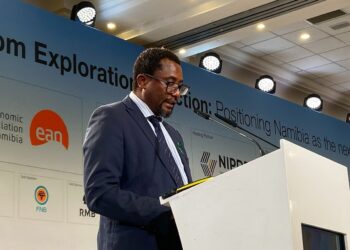
Governor of the //Kharas Region Aletha Fredericks says 22 boreholes were drilled by the Ministry of Agriculture, Water, and Land Reform (MAWLR) with 20 proving successful during the 2024/25 financial year.
The boreholes will provide a much-needed boost to water supply, supporting both agricultural activities and the livelihoods of local communities in the //Kharas Region.
“Ten boreholes were installed, and seven have been completed this financial year. Additionally, eight water points were rehabilitated, with another eight restored through the Social Security Fund,” Fredericks told a recently held MAWLR Performed Review Workshop Quarter Two 2024/2025 financial year.
Fredericks added that the achievements are evidence of the productiveness and commitment of the ministry in the //Kharas Region.
“I am confident that by continuing to collaborate, we will be able to build on our successes and further improve the lives of our communities,†she said.
The ministry also completed one earth dam at Koichas and plans to build another in the current financial year.
In the Karasburg East Constituency, two mini-desalination plants were completed, with two more planned.
Meanwhile, six toilets were constructed under the Namibia Water Sector Support Program and 28 toilets were built through the Social Security Programme.
Fredericks noted the achievements of the Division of Lands, which registered 154 customary land rights and six leaseholds to enhance tenure security.
“The division acquired 166.0479 hectares of land for resettlement purposes and valued two farms for potential acquisition related to the Neckartal Dam Irrigation Scheme. Boreholes were sited, drilled, and installed on 25 farming units,” she said.
The Division of Agricultural Extension Services also made notable strides as lead farmers were trained under the Comprehensive Conservation Agriculture Program, and demonstration plots were established.
“Farmers received training on horticulture production through the Horticulture Support Program, while the Small Stock Distribution and Development Program distributed small stocks to farmers,” she noted.
Furthermore, training on poultry production was also provided, along with subsidised fodder and licks as part of the drought relief program.
Fredericks emphasised the importance of utilising land around the Neckartal Dam.
“I am informed that to date the ministry has managed to acquire over 19,304 hectares of land for irrigation purposes around Neckartal,†she said while urging for swift action to ensure that the land is put into production.
This comes as the ministry has allocated a budget of 20 million for the 2024/25 financial year to design and supervise the construction of approximately 2,000 hectares for the irrigation project at Neckartal.
“This process is long overdue, though we understand that there have been a lot of tender cancellations in the past, I can’t overemphasise the urgency and importance of having an irrigation scheme at Neckartal,†Fredericks added.











